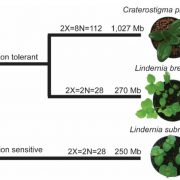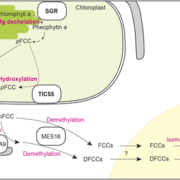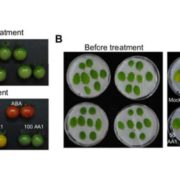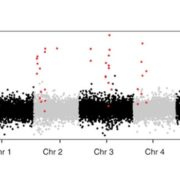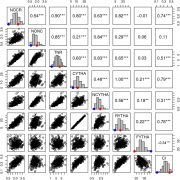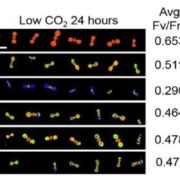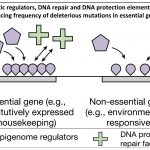TT2 controls rice thermotolerance through SCT1-dependent alteration of wax biosynthesis (Nature Plants)
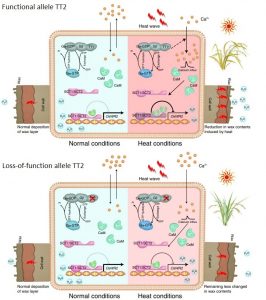 Global warming severely affects agricultural harvests, risking food security. To deal with heat stress, plants show different strategies. Indeed, heat increases intracellular Ca2+ levels to activate a heat shock response. In addition, GTP-binding proteins, which transduce extracellular signals to intracellular effectors, regulate Ca2+ currents when plants face abiotic stresses through calmodulin-binding proteins (CaM). In this work, Kan et al., identified a quantitative trait locus (QTL) TT2 (THERMOTOLERANCE 2) which encodes for a G-protein subunit (Gγ) and that provides thermotolerance in rice. When rice plants carry the natural allele of disrupted TT2 they show less reductions in wax content compared with the plants carrying the non-disrupted allele of TT2. Furthermore, plants with disrupted the TT2 allele show an attenuated Ca2+ spike which reduces the Ca2+-dependent interaction beteeen CaM and the transcription factor SCT1 (Sensing Ca2+ Transcription factor 1). A downstream target of SCT1 is Wax Synthesis Regulatory 2 (OsWR2), thus leading to the reduction of wax content. This work increases the number of available genetic tools to develop tolerant crops to heat stress. (Summary by Eva Maria Gomez Alvarez, @eva_ga96) Nature Plants. 10.1038/s41477-021-01039-0
Global warming severely affects agricultural harvests, risking food security. To deal with heat stress, plants show different strategies. Indeed, heat increases intracellular Ca2+ levels to activate a heat shock response. In addition, GTP-binding proteins, which transduce extracellular signals to intracellular effectors, regulate Ca2+ currents when plants face abiotic stresses through calmodulin-binding proteins (CaM). In this work, Kan et al., identified a quantitative trait locus (QTL) TT2 (THERMOTOLERANCE 2) which encodes for a G-protein subunit (Gγ) and that provides thermotolerance in rice. When rice plants carry the natural allele of disrupted TT2 they show less reductions in wax content compared with the plants carrying the non-disrupted allele of TT2. Furthermore, plants with disrupted the TT2 allele show an attenuated Ca2+ spike which reduces the Ca2+-dependent interaction beteeen CaM and the transcription factor SCT1 (Sensing Ca2+ Transcription factor 1). A downstream target of SCT1 is Wax Synthesis Regulatory 2 (OsWR2), thus leading to the reduction of wax content. This work increases the number of available genetic tools to develop tolerant crops to heat stress. (Summary by Eva Maria Gomez Alvarez, @eva_ga96) Nature Plants. 10.1038/s41477-021-01039-0


